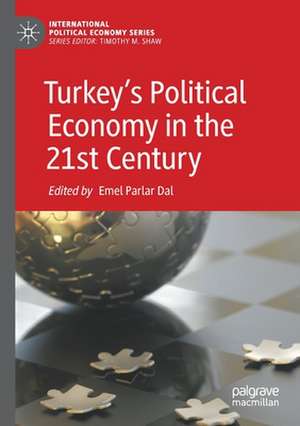Turkey’s Political Economy in the 21st Century: International Political Economy Series
Editat de Emel Parlar Dalen Limba Engleză Paperback – 11 ian 2021
| Toate formatele și edițiile | Preț | Express |
|---|---|---|
| Paperback (1) | 890.68 lei 6-8 săpt. | |
| Springer International Publishing – 11 ian 2021 | 890.68 lei 6-8 săpt. | |
| Hardback (1) | 894.46 lei 6-8 săpt. | |
| Springer International Publishing – 17 dec 2019 | 894.46 lei 6-8 săpt. |
Din seria International Political Economy Series
- 9%
 Preț: 831.25 lei
Preț: 831.25 lei - 20%
 Preț: 751.84 lei
Preț: 751.84 lei - 17%
 Preț: 490.25 lei
Preț: 490.25 lei - 17%
 Preț: 363.48 lei
Preț: 363.48 lei - 20%
 Preț: 690.96 lei
Preț: 690.96 lei - 20%
 Preț: 627.55 lei
Preț: 627.55 lei - 9%
 Preț: 762.80 lei
Preț: 762.80 lei -
 Preț: 430.59 lei
Preț: 430.59 lei -
 Preț: 428.68 lei
Preț: 428.68 lei -
 Preț: 147.23 lei
Preț: 147.23 lei - 20%
 Preț: 566.64 lei
Preț: 566.64 lei -
 Preț: 385.08 lei
Preț: 385.08 lei -
 Preț: 389.11 lei
Preț: 389.11 lei - 15%
 Preț: 644.30 lei
Preț: 644.30 lei -
 Preț: 389.31 lei
Preț: 389.31 lei - 15%
 Preț: 644.30 lei
Preț: 644.30 lei -
 Preț: 413.84 lei
Preț: 413.84 lei -
 Preț: 387.38 lei
Preț: 387.38 lei - 15%
 Preț: 638.89 lei
Preț: 638.89 lei - 15%
 Preț: 644.63 lei
Preț: 644.63 lei - 18%
 Preț: 893.71 lei
Preț: 893.71 lei -
 Preț: 412.47 lei
Preț: 412.47 lei -
 Preț: 325.08 lei
Preț: 325.08 lei -
 Preț: 395.47 lei
Preț: 395.47 lei - 15%
 Preț: 641.85 lei
Preț: 641.85 lei -
 Preț: 391.40 lei
Preț: 391.40 lei -
 Preț: 388.34 lei
Preț: 388.34 lei - 15%
 Preț: 640.55 lei
Preț: 640.55 lei -
 Preț: 389.70 lei
Preț: 389.70 lei - 15%
 Preț: 646.30 lei
Preț: 646.30 lei - 15%
 Preț: 637.78 lei
Preț: 637.78 lei - 15%
 Preț: 643.84 lei
Preț: 643.84 lei -
 Preț: 386.99 lei
Preț: 386.99 lei - 15%
 Preț: 641.53 lei
Preț: 641.53 lei -
 Preț: 386.81 lei
Preț: 386.81 lei - 15%
 Preț: 639.73 lei
Preț: 639.73 lei - 18%
 Preț: 944.19 lei
Preț: 944.19 lei -
 Preț: 391.40 lei
Preț: 391.40 lei -
 Preț: 330.65 lei
Preț: 330.65 lei -
 Preț: 394.12 lei
Preț: 394.12 lei -
 Preț: 386.99 lei
Preț: 386.99 lei -
 Preț: 386.81 lei
Preț: 386.81 lei -
 Preț: 387.75 lei
Preț: 387.75 lei - 15%
 Preț: 634.68 lei
Preț: 634.68 lei -
 Preț: 392.60 lei
Preț: 392.60 lei - 15%
 Preț: 641.53 lei
Preț: 641.53 lei - 15%
 Preț: 640.06 lei
Preț: 640.06 lei - 15%
 Preț: 643.16 lei
Preț: 643.16 lei - 15%
 Preț: 642.68 lei
Preț: 642.68 lei - 15%
 Preț: 641.85 lei
Preț: 641.85 lei
Preț: 890.68 lei
Preț vechi: 1086.20 lei
-18% Nou
Puncte Express: 1336
Preț estimativ în valută:
170.45€ • 177.30$ • 140.72£
170.45€ • 177.30$ • 140.72£
Carte tipărită la comandă
Livrare economică 15-29 aprilie
Preluare comenzi: 021 569.72.76
Specificații
ISBN-13: 9783030276348
ISBN-10: 3030276341
Pagini: 303
Ilustrații: XXVI, 303 p. 40 illus., 19 illus. in color.
Dimensiuni: 148 x 210 mm
Greutate: 0.44 kg
Ediția:1st ed. 2020
Editura: Springer International Publishing
Colecția Palgrave Macmillan
Seria International Political Economy Series
Locul publicării:Cham, Switzerland
ISBN-10: 3030276341
Pagini: 303
Ilustrații: XXVI, 303 p. 40 illus., 19 illus. in color.
Dimensiuni: 148 x 210 mm
Greutate: 0.44 kg
Ediția:1st ed. 2020
Editura: Springer International Publishing
Colecția Palgrave Macmillan
Seria International Political Economy Series
Locul publicării:Cham, Switzerland
Cuprins
1. The Changing Landscape and Dynamics of Turkey’s Political Economy in the 21st Century: An Introduction.- 2. The Political Economy of Turkey’s Economic Miracles and Crisis.- 3. Income Inequality in Turkey: 2003-2015.- 4. Turkish Labor Market: Complex Dynamics and Challenges.- 5. Syrian entrepreneurs in Turkey: emerging economic actors and agents of social cohesion.- 6. Locating Turkey in the Donor World: A Comparative Analysis.- 7. Emerging Middle Powers (MIKTA) in Global Political Economy: Preferences, Capabilities and their Limitations.- 8. The Determinants of Turkish Foreign Aid: An Empirical Analysis.- 9. The Political Economy of Turkey’s Integration into the MENA Economy.- 10. Assessing the Turkish “Trading State” in the Sub-Saharan Africa.- 11. The Political Economy of Turkey’s Relations with the Asia-Pacific.
Notă biografică
Emel Parlar Dal is Associate Professor at Marmara University’s Department of International Relations, Turkey.
Textul de pe ultima copertă
This book shows the remarkable diversification in Turkey’s international political economy landscape in the 2000s: its domestic political-economy framework, instrumental alternatives and geographic outreach. It assesses both how an emerging economy like Turkey copes with domestic and external challenges and the question of how substantial Turkey’s recent rise in global politics really is. The volume also explains Turkey’s economic growth and political transformation in line with the changes occurring in world economics, from the Washington Consensus era to the current “mix” or “hybrid” era encompassing both the characteristics of the Post-Washington and Beijing Consensus eras. The contributors portray the complexity of Turkish politics and its fragilities at the political economy level.
Emel Parlar Dal is Associate Professor at Marmara University’s Department of International Relations, Turkey.
Caracteristici
Rethinks Turkey’s political economy with an eye to explaining Turkey’s economic growth and political transformation Scrutinizes the transformation experienced in Turkey’s political economy in the 2000s, and links this transformation with the changing preferences in Turkish foreign policy Examines the overarching framework of the interplay between domestic, instrumental and geographic diversifications of Turkey’s political economy
